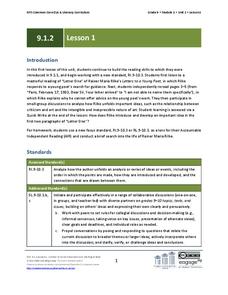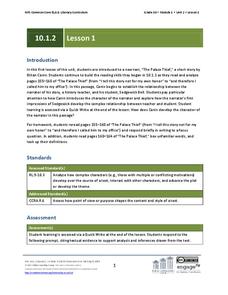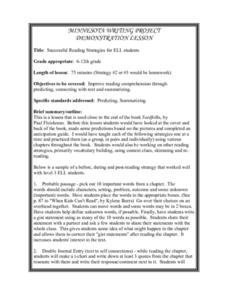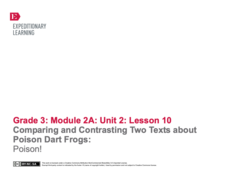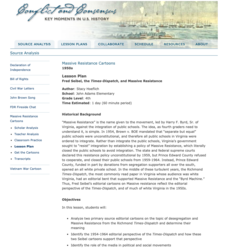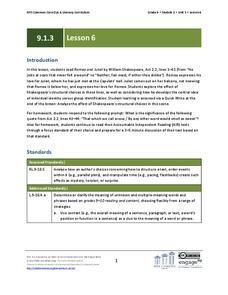Curated OER
Ordinary People: Anticipation Guide
Activate your pupils' thinking before reading chapter five of Ordinary People. Learners decide whether they agree or disagree with six statements and discuss their ideas in small groups. They then read chapter five and determine...
Pearson Longman
Emotions Reading
Explore the many types of feelings and how people express them with a activity compiled of kid-friendly activities that spark critical thinking, self-reflection, and reinforce language and writing skills. Scholars delve into the variety...
National Endowment for the Humanities
“Read All About It”: Primary Source Reading in “Chronicling America”
Can investigative journalism become too sensationalistic and accusatory, or is it vital for the survival of a democracy? Middle schoolers analyze primary source documents from early 20th-century newspapers as well as Theodore...
Museum of Disability
Don't Laugh at Me
You can prevent bullying in your classroom by addressing kindness, empathy, and acceptance with your littlest learners early on. After reading Don't Laugh at Me by Steve Seskin and Allen Shamblin, kids discuss the ways that words...
Curated OER
Amos and Boris: Text Study
Twenty insightful questions follow a read aloud of the story, Amos and Boris by William Steig. Scholars then show what they know through completion of a cause and effect chart, reading fluency assessment, and a written...
August House
The Archer and the Sun
Reinforce reading comprehension with a instructional activity about The Archer and the Sun, a Chinese folktale. Kids learn some background information about Chinese culture before reading the story, and answer literacy...
Curated OER
Print & Go ESL
Improve reading comprehension with a set of ESL worksheets. Kids read through various passages, note which facts are true or false, mark their opinion on two statements, and write a short reply based on a writing prompt.
August House
A Tale of Two Frogs
Ribbit ribbit! Hop through a series of activities based on A Tale of Two Frogs. Kids read the Russian folktale and answer reading comprehension questions before working on phonics exercises, tracing dotting lines to make a path...
EngageNY
Grade 9 ELA Module 1, Unit 2, Lesson 1
Where does a writer find inspiration? "Go into yourself," says Rainer Maria Rilke in "Letter One" from Letters to a Young Poet. Readers of Rilke's letter to Franz Xaver Kappus examine the words and figurative language Rilke uses to...
EngageNY
Introducing Research Folders and Generating a Research Question
Take the next step in the writing process with a lesson plan geared towards the completion of writing an evidence-based essay about a rule to live by, as Bud did in Bud, Not Buddy by Christopher Paul Curtis. Pupils collaborate with their...
EngageNY
Grade 10 ELA Module 1: Unit 2, Lesson 1
The complex relationship between a teacher and his student takes center stage in an instructional activity that asks readers to pay close attention to how author Ethan Canin introduces his characters and how he develops the character of...
EngageNY
Grade 9 ELA Module 1: Unit 3, Lesson 5
Class members continue their study of Romeo and Juliet by watching scenes from Baz Luhrmann’s Romeo + Juliet and then examining the figurative language Shakespeare uses in Act 1, scene 5, lines 92–109 when Romeo and Juliet meet at the ball.
Curated OER
Aliens Ate My Homework: chapter 10
For this comprehension worksheet, students read the book Aliens Ate My Homework chapter 10, and answer short answer questions. Students complete 10 problems.
Curated OER
Successful Reading Strategies for ELL Students
Students improve their reading comprehension through predicting, connecting with text and summarizing. Students should have already read the book Seedfolks and made predictions based upon what they had seen from the cover and pictures...
Curated OER
Read Aloud/ Narrative Analysis
Fourth graders read passages of Koya's Cousin Del before answering questions in a discussion setting. They listen to a variety of musical pieces before detailing how the music makes them feel in a short piece of writing. They share their...
Curated OER
Email Buddies
Collaborate with another class (or school) and have your learners share ideas about their reading through the use of email. Perhaps you'll create a specific question or a few questions for writers to choose from. Not only will they...
Curated OER
Tracing The Origins of Autism: A Spectrum of New Studies
Has the occurrence of autism increased over the years, or do the changes in diagnostic criteria account for the difference? High schoolers read an article about autism spectrum disorders and the related epidemiological studies that have...
Curated OER
Interjections
Teach your class that they can use interjections to make their writing more interesting. Individuals read a selection of sentences from their book using great expression and then explain to the teacher how interjections can make their...
EngageNY
Comparing and Contrasting Two Texts about Poison Dart Frogs: Poison!
Scholars compare and contrast two informational texts about Poison Dart Frogs. A brief vocabulary review and discussion lead the way to a two-part close reading—the first reading for gist the second reading for details. Followed by a...
National Wildlife Federation
Hot, Hotter, Hottest: Extreme Weather's Impact on Our Resources
How dry is it? It's so dry, the river only runs twice a week! Through an analysis of maps and discussions, pairs learn about droughts across the United States in the ninth of 12 lessons. They then read about, answer questions, analyze...
Turabian Teacher Collaborative
Parts of Argument II: Article Critique
Break down the parts of argumentative writing with a critical thinking activity. High schoolers read an article of your (or their choice), and use a graphic organizer to delineate the ways the author structures his or her arguments.
Roy Rosenzweig Center for History and New Media
Fred Seibel, the Times-Dispatch, and Massive Resistance
A lesson challenges scholars to analyze editorial cartoons created by Fred Seibel, illustrator for the Times-Dispatch, during the Massive Resistance. A class discussion looking at today's editorial pages and Jim Crow Laws leads the...
EngageNY
Grade 9 ELA Module 1: Unit 3, Lesson 6
The balcony scene from Romeo and Juliet takes center stage as class members consider the structural choices Shakespeare makes, i.e., having Romeo appear first in the scene and having Juliet appear unaware that Romeo is listening to her...
August House
How Tiger Got His Stripes
How did the tiger get its stripes? Kindergartners read a Vietnamese folk tale, "How the Tiger Got His Stripes," retold by Rob Cleveland, and work through several reading comprehension and literary analysis activities.
Other popular searches
- Reading Homework Packets
- Reading Homework Log
- Homework Sheet Reading
- Cloze Test About Homework Stew
- Sight Word Reading Homework








